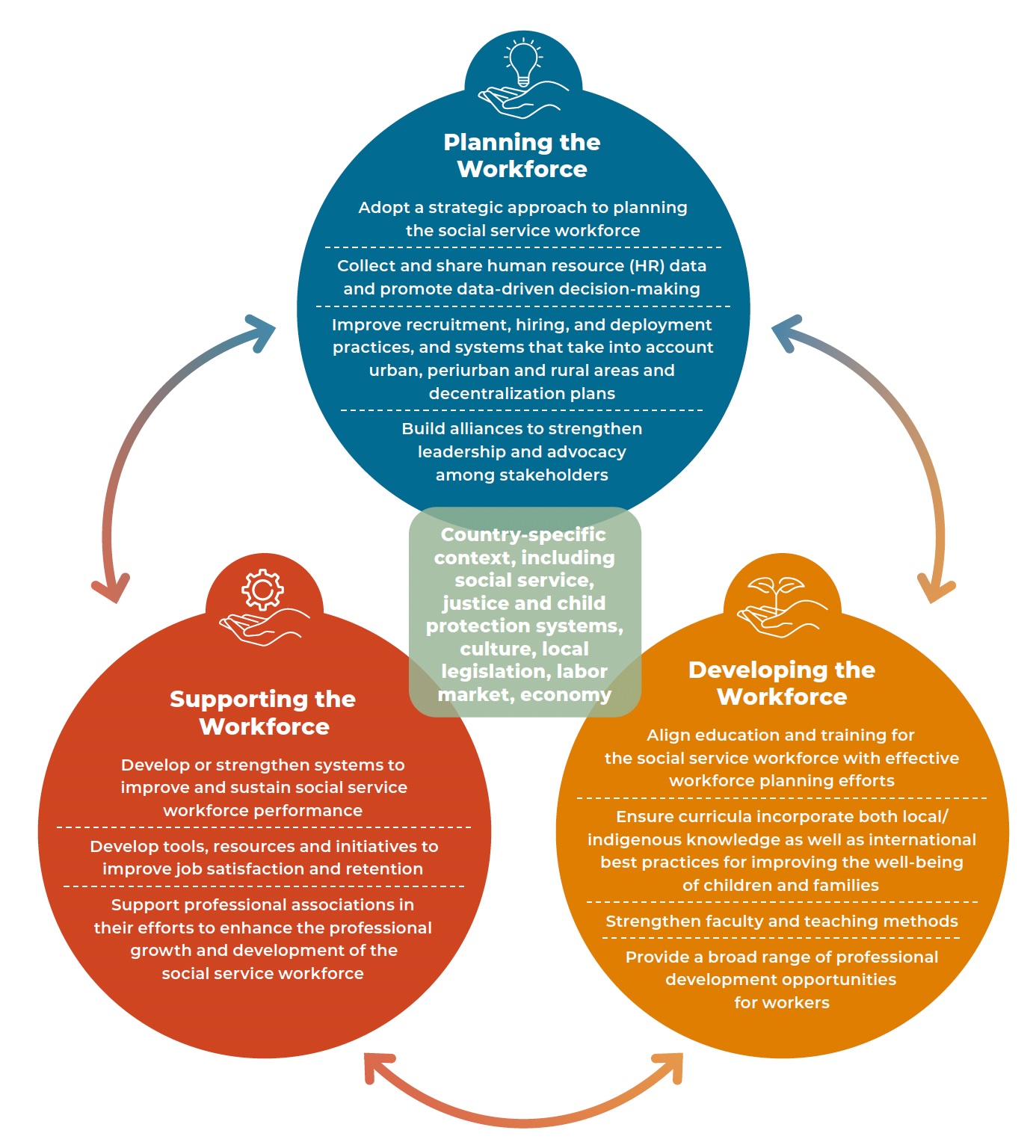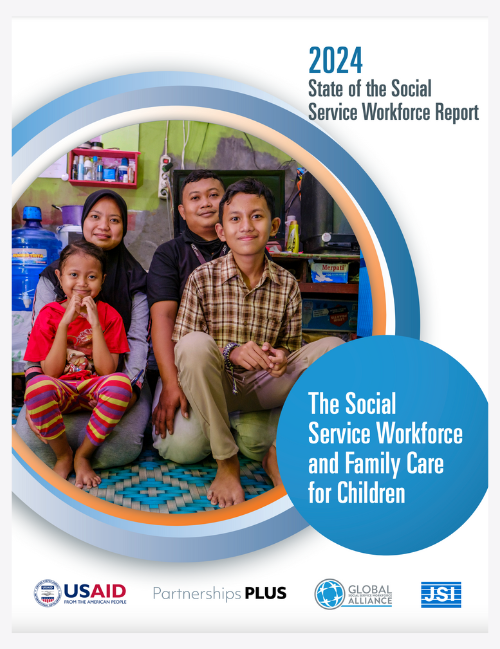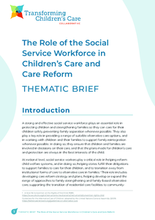Introduction:
A strong and effective social service workforce plays an essential role in protecting children and strengthening families so they can care for their children safely, preventing family separation whenever possible. They also play a key role in providing a range of suitable alternative care options, and in working with children and their families to support family reintegration whenever possible. In doing so, they ensure that children and families are involved in decisions on their care, and that the plans made for children’s care and protection are always in the best interests of the child.
At national level, social service workers play a critical role in helping reform child welfare systems, and in doing so, helping states fulfill their obligations to support families to care for their children, and to transition away from institutional forms of care to alternative care in families. Their role includes developing care reform strategy and plans, helping develop or expand the range of approaches to family strengthening and family-based alternative care, supporting the transition of residential care facilities to community-based family services, raising public awareness of the care reform vision and strategy, and mobilizing and coordinating support from community-based organizations and service providers.
However, care reform is more than the transition from residential to family-based forms of care. To be truly effective, care reform requires the transformation of the goals, structures and practices of the surrounding systems that underpin child welfare, including the child protection system. Such holistic transformation depends as much on the principles and ways of working of the social service workforce, as it does on the adoption of new laws and policies. This includes the role of the workforce in addressing the factors that push children into the care system, such as the lack of child- and family-centered services at the community level, including services that are inclusive of children with disabilities and their families. It also includes setting up and running mechanisms for gatekeeping, which is the term used in many countries for the process of multi-agency assessment and decision making that prevents unnecessary admission of children to alternative care, and ensures, when alternative care is required, that they are always placed in the most suitable form of care, including family care wherever possible.
The social service workforce includes professional social workers, para professionals and trained volunteers working together to deliver and facilitate access to social services to enhance child and family well-being and identify and manage risks. A well-planned, developed and supported social service workforce, with sufficient training and resources, is essential for countries to achieve lasting child care system reform. States therefore need to commit adequate investment to ensure they have the workforce required for them to provide care and protection for children in line with the international standards and rights enshrined in the UN Convention on the Rights of the Child (UNCRC), the UN Convention on the Rights of Persons with Disabilities (UNCRPD), the UN Guidelines on the Alternative Care for Children, the 2019 General Assembly Resolution on Promotion and Protection of the Rights of the Child and national laws and frameworks.
Audience:
This thematic brief was developed to help government policy and decision-makers understand this essential role of the social service workforce and how to strengthen that workforce in line with their national commitments to care reform and regional and global conventions. This brief includes high level guidance, recommendations and practical examples from diverse contexts for policy and decision-makers to consider in developing, supporting and strengthening the social service workforce.

Social Service Workforce Strengthening Framework (GSSWA, 2013)
2024 State of the Social Service Workforce Report: The Social Service Workforce and Family Care for Children
 This year's report provides a snapshot of the key trends and promising initiatives shaping the social service workforce. It zeroes in on a particularly important issue: the critical role that the workforce plays in ensuring children can always benefit from safe and stable family care—whether that be in their own family or through family-based alternative care, when needed.
This year's report provides a snapshot of the key trends and promising initiatives shaping the social service workforce. It zeroes in on a particularly important issue: the critical role that the workforce plays in ensuring children can always benefit from safe and stable family care—whether that be in their own family or through family-based alternative care, when needed.
Webinar: Strengthening the Social Service Workforce for Family Care - Global Insights
ENGLISH RECORDING:
On October 22, the Global Social Service Workforce Alliance co-hosted a webinar with the Better Care Network (BCN) to explore progress, successes and challenges in global efforts to strengthen the social service workforce for family care and care system reform. During the webinar, presenters unveiled findings and recommendations from our 2024 State of the Social Service Workforce Report: The Social Service Workforce in Family Care for Children. Panelists also showcased the recently released thematic brief by the global Task Force on the Social Service Workforce in Care Reform under the Transforming Children’s Care Collaborative, developed to help policymakers understand the essential role of the social service workforce in enabling safe and stable family care for children. Then, through a moderated panel discussion, insights were shared on efforts to strengthen the social service workforce in family care in Jordan, India, Moldova, Guatemala and Uganda.
SPANISH RECORDING:
El 22 de octubre, la Global Social Service Workforce Alliance organizó conjuntamente un seminario web con Better Care Network (BCN) para explorar los avances, los éxitos y los desafíos en los esfuerzos globales para fortalecer la fuerza laboral de servicios sociales para el cuidado alternativo familiar y la reforma del sistema de cuidado. Durante el seminario web, presentamos los hallazgos y recomendaciones de nuestro Informe sobre el estado de la fuerza laboral de los servicios sociales de 2024: El personal de los servicios sociales en el cuidado alternativo familiar de niñas, niños y adolescentes. También presentamos el informe temático publicado recientemente por el Grupo de trabajo global sobre la fuerza laboral de los servicios sociales en la reforma del cuidado alternativo en el marco del proyecto Transforming Children’s Care Collaborative, desarrollado para ayudar a los responsables de las políticas a comprender el papel esencial de la fuerza laboral de los servicios sociales para permitir un cuidado alternativo familiar seguro y estable para los niños. Luego, a través de un panel de discusión moderado, escuchamos opiniones sobre los esfuerzos para fortalecer la fuerza laboral de los servicios sociales en el cuidado alternativo familiar en Jordania, India, Moldavia, Guatemala y Uganda.
Transforming Children's Care Collaborative Thematic Briefs Series:
This thematic brief is part of a series of briefs being developed under the Global Policy and Advocacy Working Group (GPAWG) of the Transforming Children’s Care Collaborative to be part of a global toolkit to support policy and decision makers at national, regional, and international levels to actively implement global commitments relevant to children’s rights and care.
Each thematic brief is developed by a Task Force led by members of the Collaborative through an inclusive process which includes the contributions of actors who have relevant experience and expertise to share, including from different regions and contexts, and from groups and communities who are particularly concerned or affected.
The briefs aim to articulate a set of practical measures that should be taken across different areas of care reform in order to achieve system change. They are framed by international standards and principles but seek to go beyond those to articulate what needs to be done to implement them, based on evidence and practice learning about implementation in a range of contexts and regions. Each brief includes country case examples illustrating efforts to implement these measures and lessons learnt from those.
Once finalized the thematic briefs are approved by the GPAWG before being published as a joint document of the Collaborative. Aspects of children’s care and implementation that are cross-cutting between different thematic briefs will be highlighted within each brief with links to other relevant briefs.
The thematic briefs should be seen as part of an evolving Toolkit that helps clarify and guide implementation and advocacy. They will be updated and refined in light of evidence and evolving standards and practice, and new context specific examples will be added.
If you have learning or examples to add to these briefs or would like to actively contribute to their development, we encourage you to reach out to the co-convenors of the Global Policy and Advocacy Working Group at: contact@transformcare4children.org

